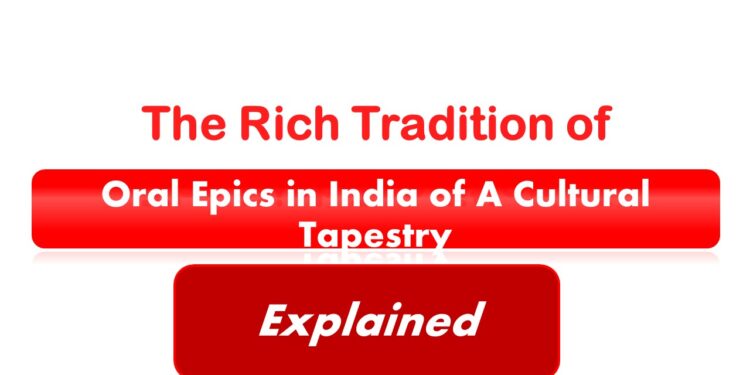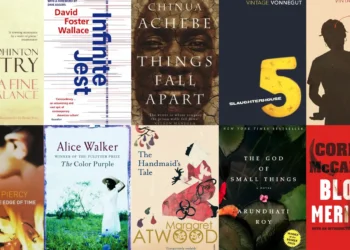The Rich Tradition of Oral Epics in India of A Cultural Tapestry
One of the many ways that India’s rich and ancient cultural legacy is expressed is through the oral epic tradition. Oral epics, or stories passed down orally from one generation to the next, are essential for maintaining and spreading historical, social, and cultural values.
Historical Backgroud:
For centuries, oral epics have been an essential component of Indian culture, acting as a means of disseminating information, values, and historical accounts. In India, oral storytelling is more common than written literature, and the epics have been essential in forming the subcontinent’s cultural identity. India’s most well-known oral epics are the Ramayana and the Mahabharata.
The Mahabharata:
The epic story of the Kurukshetra War and the destiny of the Kaurava and Pandava princes is found in the Mahabharata, which is frequently cited as the world’s longest epic poem. The sage Vyasa is traditionally credited with it. The Mahabharata has been passed down orally through a dynamic process that has seen contributions from many parts of India. Poetic meters, rhythmic recitation, and musical accompaniments are used in the oral presentation of the Mahabharata to provide the audience an immersive experience.
In the syllabi, the Mahabharata is frequently studied not only for its literary merit but also for its profound philosophical and ethical teachings. The Bhagavad Gita, a part of the Mahabharata, is often examined for its discourse on duty, righteousness, and the nature of existence. The oral tradition of the Mahabharata has ensured the preservation of these teachings, making them accessible to a wide audience over centuries.
The Ramayana:
The Ramayana, attributed to the sage Valmiki, is another significant oral epic in India. It narrates the life of Prince Rama, his quest to rescue his wife Sita from the demon king Ravana, and his eventual return to Ayodhya. The oral tradition of the Ramayana has been particularly vibrant, with different regions of India incorporating local variations and cultural nuances into the narrative.
Also Read-
- How is the area of cultural studies related to comparative literature
- The Role of Comparative Literature in Fostering World Harmony
- What do you understand by shifting perspectives and how does it influence our interpretation of a cultural work
In academic syllabi, the Ramayana is studied not only for its literary brilliance but also for its cultural and religious significance. The ethical dilemmas faced by the characters, the concepts of dharma (duty) and karma (action), and the portrayal of ideals make the Ramayana a valuable source for ethical and philosophical discussions.
Significance of Oral Epics in Indian Culture:
- Cultural Transmission: The oral epics serve as vehicles for the transmission of cultural values, beliefs, and traditions. Through the dynamic nature of oral storytelling, these epics adapt to local cultures, languages, and customs, fostering a sense of unity in diversity.
- Preservation of History: Oral epics function as repositories of historical knowledge. The Mahabharata, for instance, preserves accounts of ancient dynasties, socio-political structures, and geographical landscapes. The oral tradition ensures that historical events are not lost to time and continue to inform the understanding of India’s past.
- Moral and Ethical Guidance: Both the Mahabharata and the Ramayana provide profound moral and ethical guidance. The characters’ dilemmas and choices offer valuable insights into the complexities of human nature, morality, and the consequences of actions. The oral transmission of these epics facilitates the dissemination of ethical teachings across generations.
Oral Epics in Syllabi:
The inclusion of oral epics in academic syllabi underscores their enduring relevance and cultural importance. Students are encouraged to explore these epics not only as literary works but also as windows into the socio-cultural milieu of ancient India. The Mahabharata and the Ramayana are often studied in comparative literature courses, allowing students to analyze the distinctive narrative styles, themes, and moral lessons embedded in these epics.
Challenges and Preservation Efforts:
While the oral tradition has been instrumental in preserving and disseminating India’s cultural heritage, it is not without challenges. The advent of written literature and the digital age has led to a decline in the oral transmission of epics. Efforts are being made to document and record oral renditions, ensuring that this rich tradition is not lost to modernization.
Conclusion
India’s oral epics, such as the Ramayana and the Mahabharata, are like a complex tapestry that ties together the subcontinent’s ethical, historical, and cultural strands. The oral transmission of these epics across generations is essential to the preservation and propagation of India’s rich cultural legacy. Their incorporation into academic curricula underscores not only their literary value but also their wider significance as historical records and moral preceptors.
The epic story of the Kurukshetra War and the destiny of the Kaurava and Pandava princes is found in the Mahabharata, which is frequently cited as the world’s longest epic poem. The sage Vyasa is traditionally credited with it. The Mahabharata has been passed down orally through a dynamic process that has seen contributions from many parts of India. Poetic meters, rhythmic recitation, and musical accompaniments are used in the oral presentation of the Mahabharata to provide the audience an immersive experience.
In studying the oral epics, we embark on a journey that transcends mere literary exploration. We engage with the essence of India’s cultural identity, grapple with ethical dilemmas posed by the characters, and delve into the philosophical underpinnings that have shaped the worldview of generations. The oral tradition serves as a bridge between the ancient and the contemporary, fostering an appreciation for the diversity and unity inherent in India’s cultural landscape.
FAQ:
1: How have oral epics influenced modern literature and popular culture in India?
Oral epics have left an indelible mark on modern literature and popular culture in India. Many contemporary authors draw inspiration from the themes, characters, and moral dilemmas presented in epics like the Mahabharata and the Ramayana. Additionally, these epics continue to influence various forms of performing arts, including theater, dance, and music, contributing to a dynamic and evolving cultural landscape.
2: What challenges do oral epics face in the digital age, and how are these challenges being addressed?
The advent of the digital age poses challenges to the oral transmission of epics. The ease of access to written and digital forms of literature has led to a decline in traditional oral storytelling. Efforts are being made to address this challenge by documenting and recording oral renditions, creating digital archives, and promoting initiatives that encourage the continuation of the oral tradition. These endeavors aim to strike a balance between preserving the authenticity of oral storytelling and embracing the benefits of modern technology.
3: How do oral epics contribute to the understanding of Indian philosophy and ethics?
Oral epics, particularly the Bhagavad Gita within the Mahabharata and the ethical dilemmas presented in the Ramayana, offer profound insights into Indian philosophy and ethics. The dialogues and teachings encapsulated in these epics explore concepts of duty (dharma), righteousness, the nature of existence, and the consequences of actions (karma). Studying these epics provides a philosophical foundation that continues to shape ethical discourse in contemporary India.
4: What role do regional variations play in the oral transmission of epics in India?
Regional variations in the oral transmission of epics add layers of diversity and richness to the narratives. Different linguistic, cultural, and geographical regions contribute unique perspectives, interpretations, and adaptations of the epics. This regional diversity reflects the pluralistic nature of India, showcasing a mosaic of cultural expressions while maintaining the core themes that bind the nation together.
5: How can individuals contribute to the preservation of the oral epic tradition in India?
Individuals can contribute to the preservation of the oral epic tradition by actively participating in local storytelling events, supporting initiatives that document oral renditions, and encouraging the inclusion of oral epics in educational curricula. Additionally, raising awareness about the cultural significance of oral epics and their relevance in contemporary times can foster appreciation and engagement with this invaluable tradition.
















